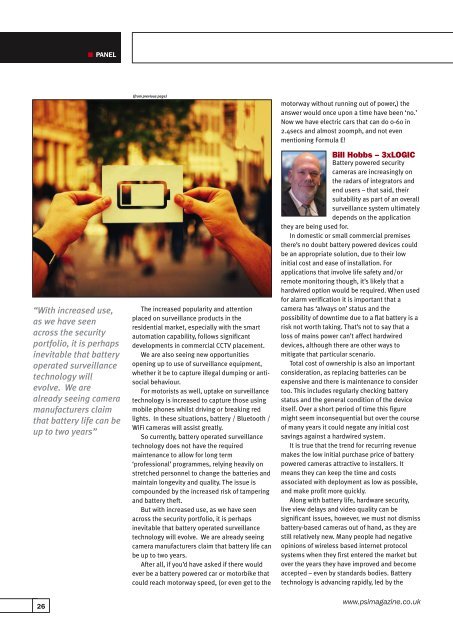PSIMay2019
Create successful ePaper yourself
Turn your PDF publications into a flip-book with our unique Google optimized e-Paper software.
PANEL<br />
“With increased use,<br />
as we have seen<br />
across the security<br />
portfolio, it is perhaps<br />
inevitable that battery<br />
operated surveillance<br />
technology will<br />
evolve. We are<br />
already seeing camera<br />
manufacturers claim<br />
that battery life can be<br />
up to two years”<br />
26<br />
(from previous page)<br />
The increased popularity and attention<br />
placed on surveillance products in the<br />
residential market, especially with the smart<br />
automation capability, follows significant<br />
developments in commercial CCTV placement.<br />
We are also seeing new opportunities<br />
opening up to use of surveillance equipment,<br />
whether it be to capture illegal dumping or antisocial<br />
behaviour.<br />
For motorists as well, uptake on surveillance<br />
technology is increased to capture those using<br />
mobile phones whilst driving or breaking red<br />
lights. In these situations, battery / Bluetooth /<br />
WiFi cameras will assist greatly.<br />
So currently, battery operated surveillance<br />
technology does not have the required<br />
maintenance to allow for long term<br />
‘professional’ programmes, relying heavily on<br />
stretched personnel to change the batteries and<br />
maintain longevity and quality. The issue is<br />
compounded by the increased risk of tampering<br />
and battery theft.<br />
But with increased use, as we have seen<br />
across the security portfolio, it is perhaps<br />
inevitable that battery operated surveillance<br />
technology will evolve. We are already seeing<br />
camera manufacturers claim that battery life can<br />
be up to two years.<br />
After all, if you’d have asked if there would<br />
ever be a battery powered car or motorbike that<br />
could reach motorway speed, (or even get to the<br />
motorway without running out of power,) the<br />
answer would once upon a time have been ‘no.’<br />
Now we have electric cars that can do 0-60 in<br />
2.4secs and almost 200mph, and not even<br />
mentioning Formula E!<br />
Bill Hobbs – 3xLOGIC<br />
Battery powered security<br />
cameras are increasingly on<br />
the radars of integrators and<br />
end users – that said, their<br />
suitability as part of an overall<br />
surveillance system ultimately<br />
depends on the application<br />
they are being used for.<br />
In domestic or small commercial premises<br />
there’s no doubt battery powered devices could<br />
be an appropriate solution, due to their low<br />
initial cost and ease of installation. For<br />
applications that involve life safety and/or<br />
remote monitoring though, it’s likely that a<br />
hardwired option would be required. When used<br />
for alarm verification it is important that a<br />
camera has ‘always on’ status and the<br />
possibility of downtime due to a flat battery is a<br />
risk not worth taking. That’s not to say that a<br />
loss of mains power can’t affect hardwired<br />
devices, although there are other ways to<br />
mitigate that particular scenario.<br />
Total cost of ownership is also an important<br />
consideration, as replacing batteries can be<br />
expensive and there is maintenance to consider<br />
too. This includes regularly checking battery<br />
status and the general condition of the device<br />
itself. Over a short period of time this figure<br />
might seem inconsequential but over the course<br />
of many years it could negate any initial cost<br />
savings against a hardwired system.<br />
It is true that the trend for recurring revenue<br />
makes the low initial purchase price of battery<br />
powered cameras attractive to installers. It<br />
means they can keep the time and costs<br />
associated with deployment as low as possible,<br />
and make profit more quickly.<br />
Along with battery life, hardware security,<br />
live view delays and video quality can be<br />
significant issues, however, we must not dismiss<br />
battery-based cameras out of hand, as they are<br />
still relatively new. Many people had negative<br />
opinions of wireless based internet protocol<br />
systems when they first entered the market but<br />
over the years they have improved and become<br />
accepted – even by standards bodies. Battery<br />
technology is advancing rapidly, led by the<br />
www.psimagazine.co.uk

















